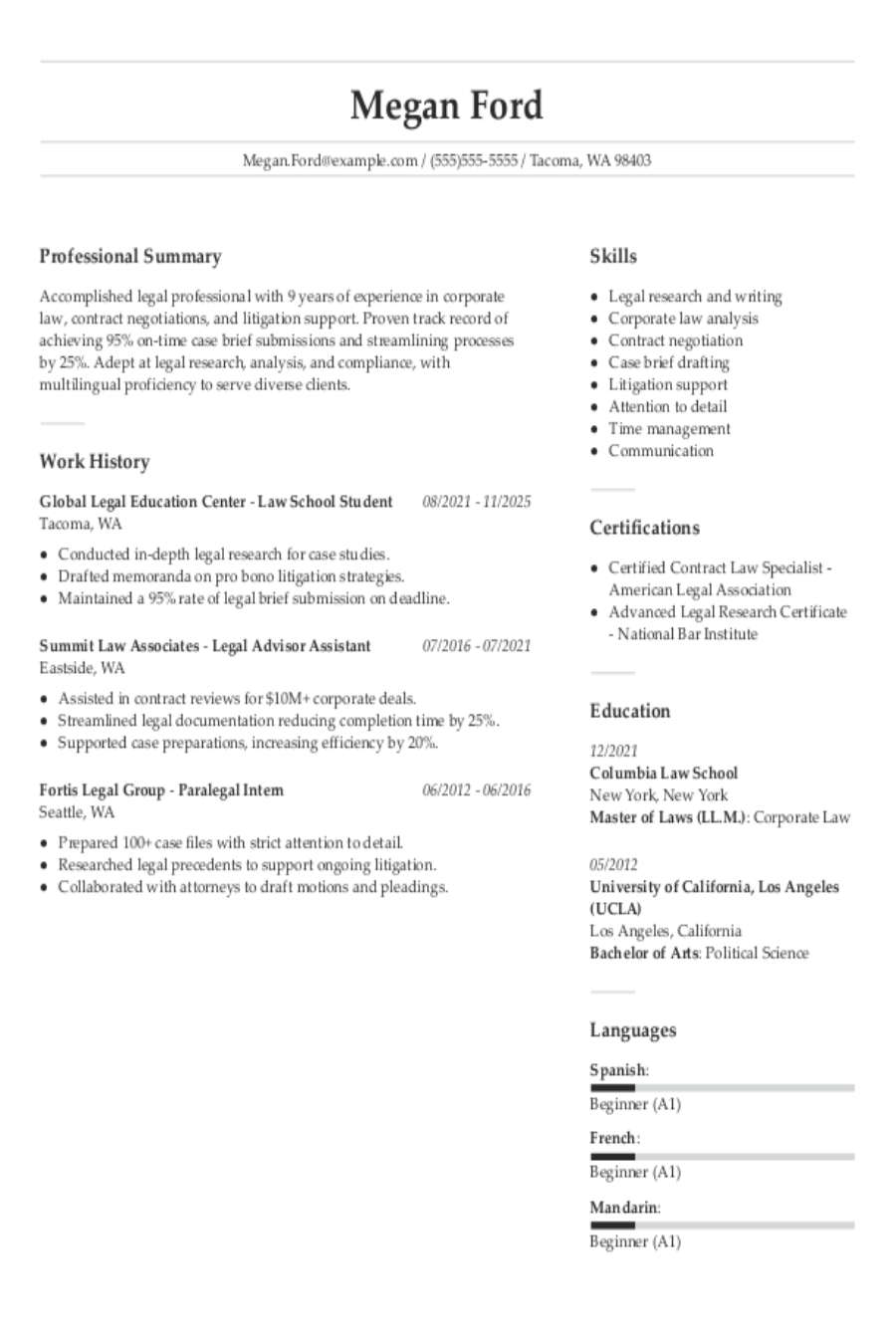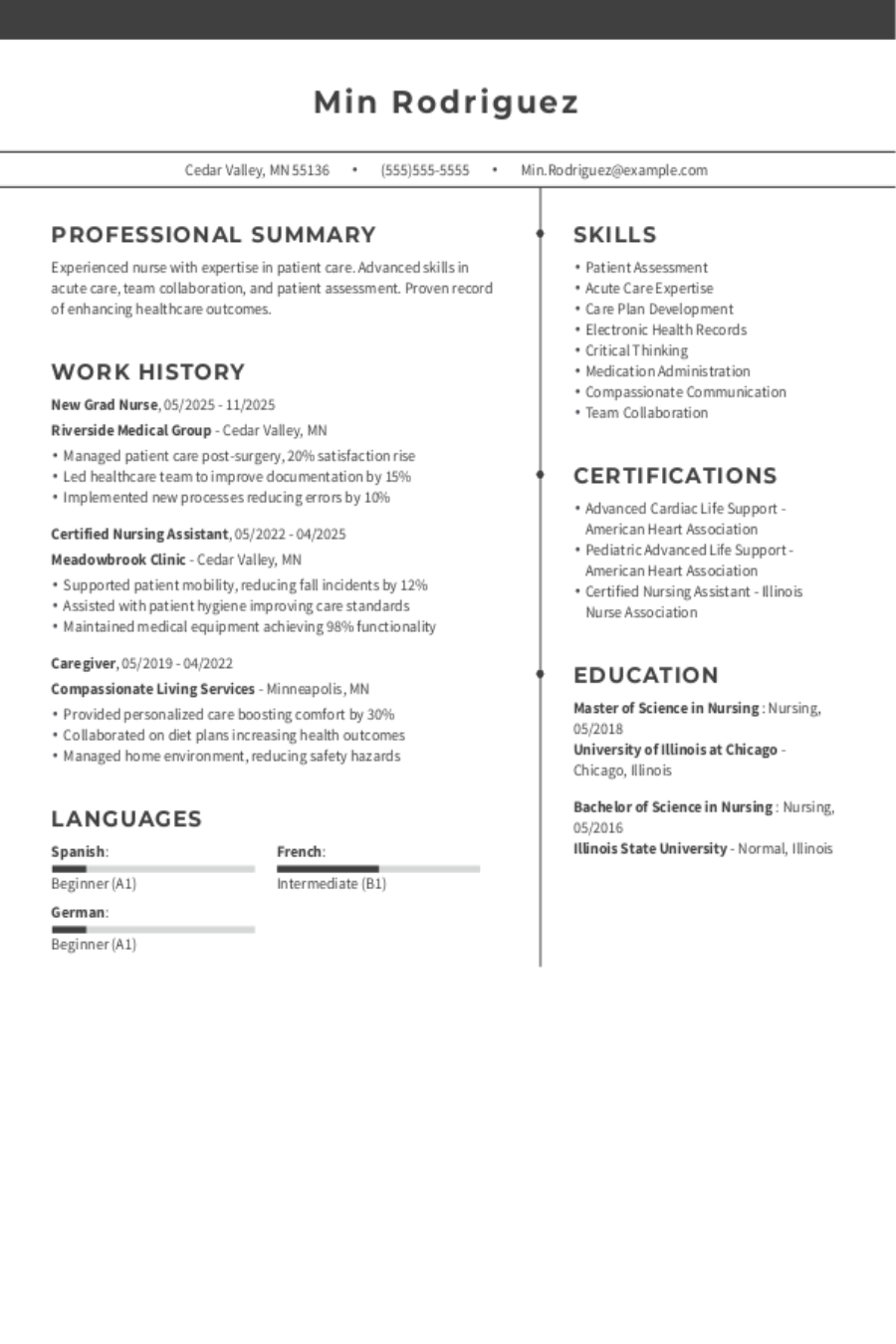Popular Medical Resume Examples
Entry-level medical resume
A medical entry-level resume should highlight relevant education, certifications, clinical skills, and volunteer experiences to show readiness for the healthcare field despite limited hands-on experience.
Emphasizes soft skills: This resume highlights the job seeker's soft skills like leadership and problem-solving, which effectively compensate for any limited experience.
Prioritizes readability: Choosing a simple resume template improves readability, enabling recruiters to easily identify key qualifications and accomplishments without navigating unnecessary clutter.
Mid-career medical resume
A mid-career medical professional's resume should emphasize a combination of clinical experience, essential skills, and ongoing education to effectively demonstrate their growth and adaptability in the healthcare field.
Balances skills and experience: This applicant's resume effectively balances technical skills in patient care and healthcare management with a clear career trajectory, showcasing their professional growth from clinical assistant to medical practitioner.
Begins with a powerful summary: This resume's professional summary highlights essential qualifications, showcasing a medical professional's experience in patient care and operational improvements.
Experienced medical resume
An experienced medical resume should prioritize highlighting relevant skills and achievements that demonstrate the job seeker's impact in patient care and professional growth within the healthcare field.
Embraces modern design: This modern resume template effectively showcases the applicant's innovative approach to healthcare, highlighting their commitment to excellence and improving patient care through efficient practices and leadership.
Quantifies achievements: Quantifiable achievements provide a clear and powerful way to showcase success. For instance, detailing the reduction of diagnostic errors by 25% or managing over 150 patients weekly makes accomplishments more relatable for recruiters.
No experience medical resume
A resume for an applicant with no experience should emphasize relevant coursework, volunteer work, and transferable skills to showcase the applicant's potential and commitment to the healthcare field.
Avoids jargon: Applicants sometimes exaggerate basic tasks with complex language, which can obscure their true value. A straightforward approach clearly highlights achievements, such as increasing workshop attendance by 30% or coordinating campaigns for 500 students, showcasing real impact effectively.
Overcomes lacking experience: Including extracurricular activities and volunteer roles improves this resume by highlighting relevant skills and commitment to community health, essential for a medical career despite limited professional experience.
More resume examples
Medical Resume Template
Looking to improve your career in healthcare? Start with this medical resume template, which you can easily adapt by filling in your personal details and experiences.
Michael Miller
Springfield, IL 62707
(555)555-5555
Michael.Miller@example.com
Professional Summary
Dedicated Medical Practitioner with 7 years' experience managing healthcare teams, improving patient outcomes, and implementing process innovations. Skilled in diagnostics, surgical assistance, and workflow optimization. Proven track record in enhancing recovery rates and reducing errors through precision-based solutions.
Work History
Medical Practitioner
Riverside Medical Group - Springfield, IL
January 2022 - November 2025
- Managed 20+ patients daily providing advanced care
- Developed patient recovery plans improving outcomes by 35%
- Reduced diagnostic errors by 15% via precision protocols
Physician Assistant
Harmony Health Center - Springfield, IL
June 2018 - December 2021
- Assisted in surgeries improving efficiency by 25%
- Supervised care teams enhancing workflow by 18%
- Trained 15 junior staff on patient care procedures
Clinical Coordinator
Greenfield Hospital - Springfield, IL
November 2015 - May 2018
- Streamlined hospital processes cutting delays by 20%
- Oversaw budget allocation ensuring optimal patient care
- Implemented new software reducing record errors by 30%
Skills
- Patient Diagnosis
- Surgical Assistance
- Health Record Management
- Hospital Workflow Optimization
- Team Leadership
- Recovery Plan Development
- Medical Software Utilization
- Budget Management
Certifications
- Advanced Cardiac Life Support (ACLS) - American Heart Association
- Certified Medical Practitioner - National Healthcare Board
Education
Master of Science Advanced Medicine
University of Texas Medical Branch Galveston, Texas
August 2014
Bachelor of Science Health Sciences
University of Houston Houston, Texas
May 2012
Languages
- Spanish - Beginner (A1)
- French - Beginner (A1)
- German - Beginner (A1)
Writing Your Medical Resume
Having explored these effective resume examples, you are now prepared to dive into the details of how to write a resume.
List your most relevant skills
Creating an effective skills section on your medical resume is important to showcase your technical capabilities, such as patient care and medical software skill, along with essential soft skills like teamwork and empathy.
To maximize your chances of being noticed by recruiters, carefully read job listings to identify keywords from the job listing that match your expertise. Incorporating these keywords into your skills section not only highlights your fit for the position but also helps applicant tracking systems recognize you as a strong applicant.
Example of skills on a medical resume
- Proficient in patient assessment and diagnostic procedures
- Skilled in developing and implementing treatment plans
- Compassionate communicator with a focus on patient education
- Strong team collaborator with effective leadership qualities
A strong skills section is important for demonstrating your readiness for a medical position. It should effectively combine the technical skills specified in the job description with essential soft skills, showcasing your complete preparation to meet the role's demands. This balance not only highlights your qualifications but also reflects your ability to thrive in a collaborative environment.
Highlight your work history
Your work experience section should highlight how you’ve applied your skills in practical settings and made a difference in patient care or operational efficiency. Incorporating relevant keywords will help catch the eye of hiring managers looking for specific competencies.
For each job entry, ensure you include key details such as your title, the name of the employer, and the dates you were employed. This information builds trust with potential employers by showing them where you've worked and when. Focus on including accomplishments that are quantifiable, effectively showcasing your contributions.
Example of a medical work experience entry
- Registered Nurse
HealthFirst Clinic - Dallas, TX
June 2021 - Present - Assist healthcare providers in patient examinations and procedures, ensuring a smooth workflow and optimal patient care
- Manage patient scheduling and follow-up appointments, reducing wait times by 30% through efficient calendar management
- Maintain accurate electronic health records (EHR) for over 500 patients, improving data retrieval speed and compliance with HIPAA regulations
- Educate patients on treatment plans and medications, improving their understanding and adherence to prescribed therapies
- Collaborate with medical staff to implement new protocols that improved clinic efficiency and increased patient satisfaction scores by 15%
Quantifying achievements in the medical field is vital to illustrate the impact of your work. For example, highlighting that you reduced patient wait times by 40% demonstrates your effectiveness in improving operational efficiency and improving patient care outcomes.
Include your education
The education section of your medical resume should be organized in reverse-chronological order, starting with your most recent degree. Include all relevant diplomas and degrees while omitting your high school diploma if you hold a higher degree like a bachelor’s or master’s.
For those currently pursuing a degree or if your education is incomplete, it is important to list the highest level completed and provide an expected graduation date. You may also want to incorporate bullet points that outline relevant coursework or academic achievements that apply directly to the medical field.
Common certifications for a medical resume
- Certified Medical Assistant (CMA) – American Association of Medical Assistants (AAMA)
- Registered Medical Assistant (RMA) – American Medical Technologists (AMT)
- National Certified Medical Assistant (NCMA) – National Center for Competency Testing (NCCT)
- Certified Clinical Medical Assistant (CCMA) – National Healthcareer Association (NHA)
Sum up your resume with an introduction
Creating an effective profile section in your resume is important as it forms the first impression you give to potential employers. This section succinctly encapsulates who you are as a professional, making it easier for hiring managers to quickly determine if you fit their needs.
If you have substantial experience in the medical field, consider using a professional summary. This format allows you to showcase your key accomplishments and relevant expertise right at the top of your resume. Providing tangible examples of your successes helps employers envision how you can contribute to their organization.
If you’re just starting out, write a resume objective that highlights your commitment to building your career.
Professional summary example
Compassionate medical professional with over 10 years of experience in patient care and clinical settings. Demonstrated success in improving patient outcomes, managing healthcare teams, and implementing effective treatment plans. Highly proficient in patient assessment, diagnostic procedures, and interdisciplinary collaboration to promote holistic health.
Resume objective example
Enthusiastic medical professional eager to apply strong communication, empathy, and teamwork skills in a healthcare setting. Committed to improving patient care and supporting efficient operations within a collaborative team environment while continuously developing clinical expertise.
When crafting your resume profile for a medical position, prioritize integrating relevant keywords from job descriptions. This section serves as your first opportunity to showcase qualifications that align with what employers seek. By doing so, you improve your chances of passing through ATS screenings and landing an interview.
Add unique sections to set you apart
Improve your resume by adding optional sections that highlight your unique qualifications for medical positions. These sections allow you to present additional information that sets you apart from other applicants.
By including relevant hobbies and volunteer experiences, you can demonstrate your commitment to healthcare and the values that drive you. For instance, if you participate in community health initiatives or have interests in wellness activities, it not only showcases your skills but also reflects your dedication to improving patient outcomes.
Three sections perfect for a medical resume
- Languages: In the medical field, effective communication plays a key role in patient care. If you are fluent in multiple languages, showcase your language skills on your resume to improve interactions with diverse patients.
- Volunteer Work: Including volunteer work on a resume showcases your dedication to helping others and helps build your professional skills, making you a well-rounded applicant in the medical field.
- Accomplishments: In the medical field, quantifiable accomplishments are vital for demonstrating the effectiveness of your care and improving patient outcomes. Highlight these achievements by incorporating them into your work history or featuring them in a separate accomplishments section.
5 Resume Formatting Tips
- Choose a format that matches your career stage.
Choosing the right resume format depends on your experience. If you have a solid work history, consider a chronological format to highlight your career progression. For those just starting out, a functional resume can showcase your skills effectively. A combination resume might be ideal if you want to present both your skills and experience harmoniously.
- Pick a smart resume template.
Using a professional resume template is key to improving readability and formatting. It allows your qualifications to shine by presenting them clearly. If you opt for a custom layout, ensure it's straightforward and uses fonts that are compatible with applicant tracking systems.
- Select an appropriate font.
Opt for a clean, professional font to improve your resume's readability. Fonts such as Helvetica, Georgia, or Verdana are effective choices for both applicant tracking systems and human reviewers alike.
- Use consistent formatting.
Ensure your resume has uniform margins and is aligned to the left. This creates a clean, professional look that improves readability and makes a lasting impression.
- Keep your resume to one or two pages.
When outlining your resume, remember that resumes should be one page long unless you have extensive experience. Focus on keeping your content concise and relevant to showcase your key qualifications effectively.
Tools for Your Job Search
Are you preparing to apply for a medical position that excites you? Before submitting your application, use our ATS Resume Checker to analyze how well your resume aligns with the automated systems commonly employed by healthcare employers during their initial screening process.
Trying to make your application stand out? The AI Resume Builder offers personalized suggestions tailored to your medical background and provides professional templates designed to highlight your skills and experience effectively.
Frequently Asked Questions
Last Updated: November 25, 2025
Yes, a cover letter is important as it provides context to your resume and creates valuable communication opportunities with employers. It allows you to express your enthusiasm for the role and highlight how your medical experience makes you a suitable job seeker. So, don’t hesitate—write a cover letter that captures your unique qualifications.
For a quick solution, check out our AI Cover Letter Generator, which can help you craft a personalized cover letter in just minutes. You’ll find various cover letter template options that align perfectly with your resume, making it easy to present a polished and professional application.
A resume is a concise document, typically spanning one to two pages, that highlights your relevant work experience and skills. In contrast, a CV (curriculum vitae) can extend several pages and provides a comprehensive overview of your academic background, research contributions, publications, and professional experiences.
You’ll often need a CV for roles in academia, science, law, or specialized fields such as medicine. If you're unsure which format to use, our online CV Maker can assist you! With various CV templates tailored for different industries and career levels, you can quickly create a professional CV that stands out.
A medical resume is typically one page long, as this length usually suffices to highlight your qualifications and experience. However, if you possess extensive experience or specialized skills, a two-page resume may be appropriate to effectively showcase your background.
Choosing the right resume format is important for showcasing your strengths. Inexperienced applicants often find the functional format helpful, as it highlights skills over experience. For those with a robust work history, the chronological format is ideal because it shows career progression clearly. Mid-level professionals may prefer the combination format, which effectively balances skills and experience, providing a comprehensive view of their qualifications.
To create an impressive medical resume, select a polished, professional template and integrate keywords from the job description. This strategy emphasizes your qualifications and aligns your skills with employer expectations.
To improve your networking skills as a medical professional, regularly reconnect with former colleagues and peers in the field. Consider joining organizations like the American Medical Association for valuable resources and connections. Additionally, keep your LinkedIn profile updated to showcase your expertise and stay engaged with industry trends.
Was this information helpful? Let us know!
Keith is a Certified Professional Resume Writer (CPRW) and trusted media source in the career industry with over a decade of experience helping job seekers stand out.
More resources

What Are Resume Keywords? A Comprehensive Guide
Is your resume not getting the response you hoped for? Resume ...

Nearly 7 in 10 Workers Say Their Skills Are Underutilized at Work
Resume Now s untapped talent report shows that a growing conti...

Mechanical Engineering Resume: Examples & Templates
As a mechanical engineer you need a resume that showcases you...

Law School Resume: Examples & Templates
Creating a standout law school resume means highlighting criti...

New Grad Nurse Resume: Examples & Templates
As a new grad nurse you need a resume that highlights your cl...


